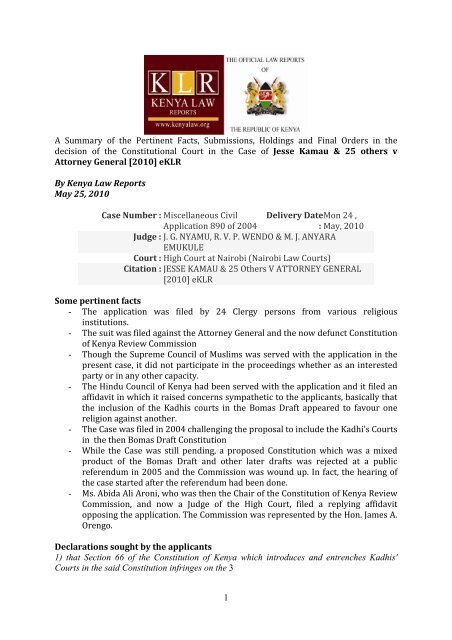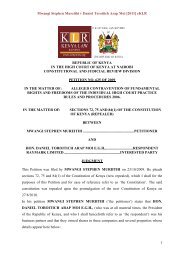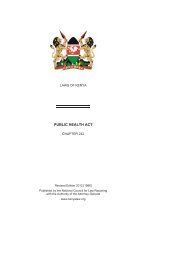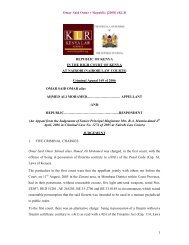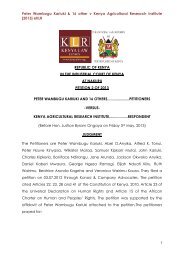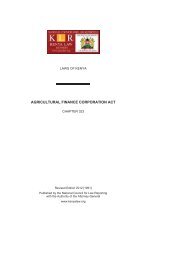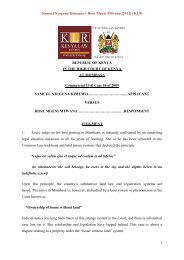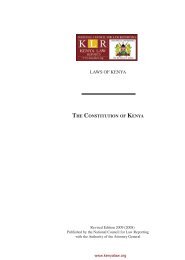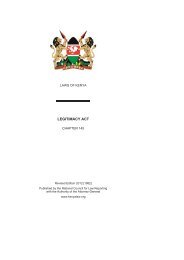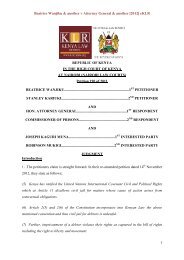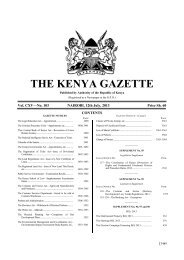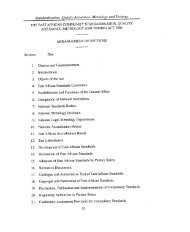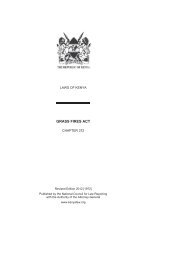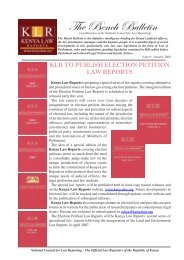Kadhi's - Kenya Law Reports
Kadhi's - Kenya Law Reports
Kadhi's - Kenya Law Reports
You also want an ePaper? Increase the reach of your titles
YUMPU automatically turns print PDFs into web optimized ePapers that Google loves.
- the Judicature too is a creation or creature of the Constitution, and whereas it haspower to interpret any provision of the Constitution (under sections 67, 84 and123(8) of the Constitution, that power is limited to interpretation andconstitutional judicial review but not alteration of the Constitution. Under itsconstitutional judicial review jurisdiction the court may grant a declaration inthe event of conflict of provisions.- Parliament does not have the power to take away the basic structures of theconstitutional "sanctum" ‐ the Bill of Rights, the security of tenure of Judges,which is the cornerstone of the rule of law, and the democratic provisions ofSection IA of the Constitution. The second exception is that it is only the peoplewho have the power to enact a new constitution- It is further correct that Section 82 provides that no law shall make anyprovision, which is discriminatory in itself or in its effect. The contention by theApplicants is that despite this specific provision (s.82) with regard to nondiscriminationthe same Constitution in Section 66 entrenches one religiouscommunity’s dogma by establishing in the Constitution, a court called the Kadhis'Court, to adjudicate that community’s religious beliefs in matters of personal law– marriage, divorce inheritance (succession) or devolution of property. For thesereasons the Applicants contend that the court should declare section 66 of theConstitution is inconsistent with section 82.- In <strong>Kenya</strong> we have witnessed that competitiveness and total intolerance to otherfaiths particularly Christianity resulting in the torching and burning to theground here in Nairobi South “B” of Our Lady Queen of Peace Catholic Churchand at the Coast of burning and razing down to the ground of five PentecostalChurches in Tana River District. This is notwithstanding that the Quran, theMuslim Holy Book, and indeed Islam acknowledges the founder of ChristianityJesus (Issa), as a muslim figure in Islam. Muslims accept many of the miracles heperformed on earth to the sick and disabled. Muslims accept the (Ascension), thebodily ascent of Jesus into heaven on the completion of his earthly career ormission.- Although theoretically at least, Islam encompasses a version of Christianity, inreality, no Muslim is likely to describe himself as a Christian and vice versa – NoChristian will call himself a Muslim.- Now both Islam and African customary law rank women lower in matters ofdevolution. Widows and daughters receive much less than men. Widows receivea life interest, daughters are virtually hounded out of their homes and woe untothem if they are unmarried. Such treatment is inherently unconstitutional beingcontrary to Section 70 which guarantees life, liberty, security of the personprotection of the law and freedom of conscience etc. without reference to sex- Constitution section 66(4)- (4) the Chief Kadhi and the other Kadhis or the Chief Kadhi and such of theother Kadhis not being less than three in number as may be prescribed by orunder an Act of Parliament shall each be empowered to hold a court of a5
Kadhi having jurisdiction within the former Protectorate or within such partof the former Protectorate as may be so prescribed.- Provided that no part of the former Protectorate shall be outside thejurisdiction of some court of a Kadhis' Court.- Since it is to the former Protectorate where the sights of the drafters of both theIndependence Constitution and the amendments thereto were trained, it cannotbe said that it was a mere error of omission when they retained language in theConstitution that the <strong>Kadhi's</strong> courts were clearly restricted to operate within theformer Protectorate which by definition extended to the ten miles beyond theIndian Ocean shoreline. For the Kadhis' Courts Act, though well intentioned, topurport to extend the jurisdiction of Kadhis' Courts beyond the formerProtectorate is clearly in breach of Section 179 (4) of the IndependenceConstitution, that is, Section 66(4) of the current Constitution.- There is no doubt in our collective mind that entrenchment of Section 66establishing the Kadhis' Courts in the Constitution is certainly inconsistent withsection 65 which grants Parliament power to establish other courts subordinateto the High Court. Section 66 certainly favours one religion in preference to otherfaiths, Christianity, Hindu, Buddhist, Bohras, and Indigenous religions andculture.- The Kadhis' Courts Act 1967, (now Chapter II, <strong>Law</strong>s of <strong>Kenya</strong>) extended thejurisdiction of the Kadhis' Court to Nyanza and Western Provinces, Rift Valley,Central, Eastern Provinces and Nairobi, areas well beyond the formerProtectorate. This was clearly in breach of Section 179 (4) of the IndependenceConstitution and now section 66 (4) of the current Constitution.- The establishment of Kadhis' courts outside the protectorate violates Section66(4) of the Constitution. The Kadhis' courts were intended to have territorialapplication within the Protectorate as defined, and on strict construction of theconstitution Kadhis' courts were restricted to the former Protectorate.- Having said as much, we are keenly aware of Section 78 of the Constitutionwhich provides for freedom of religion, for a person to manifest and propagatehis religion or belief, in worship, practice and observance, at its own expense. Itis our view that this provision covers all religious communities, includingMuslims and our construction on this is that being the anchor or umbrellaprovision in the Constitution on freedom of worship, practice and observance ofreligion and its edicts section 66(4) of the Constitution on Kadhis’ courts issuperfluous. In our view territorial jurisdiction at this time and age in ourdemocratic state curtails that freedom of worship or religion.- Having failed to alter section 179(4) [(or now Section 66(4)] of the Constitution,the provisions of Section 4 of the Kadhis' Court Act (Chapter 11 of the <strong>Law</strong>s of<strong>Kenya</strong>) establishing and extending the jurisdiction of the Kadhis' Courts beyondthe former Protectorate is contrary to and inconsistent with the said provision ofthe Constitution.6
- In exercise of its declaratory jurisdiction under Section 3 of the Constitution wefind and hold that Section 4(2) (b) of the Kadhis' Courts Act (Chapter 11, <strong>Law</strong>s of<strong>Kenya</strong>) is inconsistent with section 66(4) of the Constitution and is thereforevoid to the extent of the inconsistency- Section 66 of the Constitution on Kadhis' courts is inconsistent with the secularnature of the state and we fully adopt as good constitutional law the decision ofthe court in the Mauritian case of BISHOP OF ROMAN CATHOLIC DIOCESE OFPORT LOUIS & OTHERS v. TENGUR (supra) and also the Mauritius case ofBHEWA AND ANOTHER vs. GOVERNMENT OF MAURITIUS (supra) concerningwhat a secular state entails and the need to separate state and religion. Havingregard to the values and principles of the constitution we declare that section 66does not advance the values which characterize a secular state:o "As between the state and religion each had its own sphere, the powerof lawmaking for the public good and the latter of religious teachingobservance and practice. To the extent that Section 66 sought to giveto religious principles and commandments the forceo and character of law, religion stepped out of its own sphere andencroached on that of lawmaking in the sense that it was made tocoerce the state into enacting religious principles and commandmentsinto law. That would indeed be constitutionally possible where notonly one particular religion was the state religion but also the holybook of that religion was the supreme law."- On funding of Kadhis' Courts, we also adopt as good constitutional law thedictum in the case of ENGEL vs VITALE (supra);o "…… the price of religious freedom is double. It is that the church andreligion shall live both and upon that freedom. There cannot befreedom of religion, safeguarded by the State, and intervention by thechurch or its agencies in the State’s domain or dependency on itslargesse: . . . . The great condition of religious liberty is that it bemaintained free from sustenance, as also from other interferences, bythe state. For when it comes to rest upon that secular foundation, itvanishes with the resting.o Public money devoted to payment of religious costs, educational ornot, brings the quest for more. It brings too the struggle of sect againstsect the larger share or for any. Here one by numbers alone willbenefit most, there another. . . . The end of such strife cannot be otherthan to destroy the cherished liberty. The dominant group will achievethe dominant benefit or all will embrace the state in theirdissensions.”- We further declare that section 66 is in conflict with section 82 in that it has theeffect of furthering one faith as against the others. However our role isdeclaratory only and it is only Parliament under section 47 of the constitutionwhich can alter or amend section 66 of the Constitution or the people in areferendum.7
- However as regards Acts of Parliament we have a clear mandate to quashprovisions which are inconsistent with the Constitution and to declare null andvoid and hence our specific action on section 4 of the Kadhis' Courts Act.- We further declare that the real anchor of freedom of worship and conscience in<strong>Kenya</strong> is not Section 66 of the Constitution but Section 78, and for this reason,Section 66 is in our view superfluous and does not add or offer any additionalrights not covered by section 78 which applies to all faiths in <strong>Kenya</strong>. On thecontrary at this time and age it restricts the operation of Kadhis' courts to the tenmile former Protectorate whereas section 78 has no such territorial restrictionas regards freedom of conscience religion, or worship etc. Section 66 is also inour view in conflict with section 65 of the Constitution which contemplatessubordinate courts of universal application in the Republic of <strong>Kenya</strong>.FINAL ORDERS1. In view of the discussion above, we grant the declarations sought in prayer 1 limited todeclaring that section 66 is inconsistent with sections 65 and 82 and in respect of section82 is discriminatory to the Applicants in its effect.2. As regards paragraph 2 of the prayers we find and hold that sections 66 and 82 areinconsistent with each other, and that section 66 is superfluous but it is not the court's roleto expunge it. It is the role of Parliament and the citizenry in a referendum.3. As regards prayer 3, we hold and declare that any provision similar to section 66 in anyother Draft of a Constitution in word or effect is not ripe for determination4. The enactment and the application of the Kadhis' courts to areas beyond the 10 mileCoastal strip of the Protectorate is unconstitutional.5. We grant prayer 5 that the financial maintenance and support of the Kadhis' courtsfrom public coffers amounts to segregation, is sectarian discriminatory and unjust asagainst the Applicants and others and amounts to separate development of one religionand religious practice contrary to the principle of separation of state and religion(secularism) and is therefore contrary to the universal norms and principlesof liberty and freedom of religion envisaged under sections 70, 78 and 82 of theConstitution and also against the principle of separation of state and religion as captionedby section 1A of the Constitution.6. We also find and hold that the purported extension of the Kadhis' courts through theenactment of the Kadhis' Courts Act beyond the former Protectorate areas contravenessection 64(4) and section 4(2) (b) of the Kadhis' Courts Act and is thereforeunconstitutional, null and void to the extent of the inconsistency and for that reason adeclaration in terms of prayer 6 is granted.7. We grant the declaration in prayer 7 in relation to section 66 of the Constitution.8. We grant a declaration that any form of religious courts should not form part of theJudiciary in the Constitution as it offends the doctrine of separation of state and religion.9. We grant prayer 13 and declare that the entrenchment of the Kadhi’s courts in theConstitution elevates and uplifts the Islamic religion over and above the other religions in<strong>Kenya</strong> which is inconsistent with section 78 and 82 of the Constitution and discriminatoryin its effect against the applicants and <strong>Kenya</strong>ns of other religions.8
10. We further find and hold that prayers 9, 10, 11, 12, 14 & 15 relating respectively to theBomas Zero Draft and an Islamic Agenda are matters which are moot and speculativeandare not justiciable and decline to grant them.9


